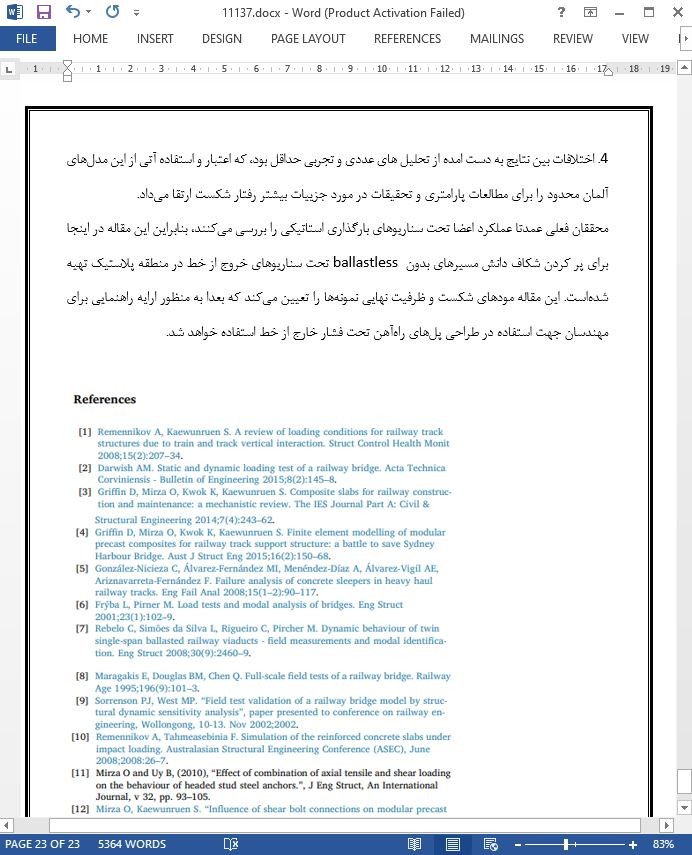
رفتار و طراحی تیرهای transom فولادی- بتنی پیش ساخته کامپوزیتی برای کاربرد در پل راه آهن
چکیده
در حال حاضر بیشتر پلهای راهآهن در استرالیا نیاز به تعویض مداوم دستگاههای انتقال الوار چوبی دارند که در سیستم راهآهن قرار دارند. تیر های (transom ) کامپوزیتی متشکل از فولاد و بتن مسلح پیشساخته به عنوان جایگزینی برای الوارهای چوبی فعلی پیشنهاد شدهاند. این مقاله به تشریح مزایای سازه ای transoms کامپوزیتی فولادی-بتنی برای خطوط بدون بالاست در هنگام مقاومسازی برای پلهای فولادی راهآهن موجود میپردازد. با این حال، در مطالعات موجود، مشخص شدهاست که تحقیقات کمی در مورد تاثیر خروج از خط ریل بر روی بارگذاری transoms بتن مسلح وجود دارد. بنابراین، این مقاله به بررسی تاثیر خروج از خط ریل روی transoms بتن مسلح پیشساخته میپردازد. این مقاله در اینجا به بررسی خارج شدن از ریل یک transoms ناشی از بارگذاری ضربه ای قطار از طریق آزمایش تجربی و تحلیل عددی transoms بتن مسلح معمولی میپردازد. این مقاله همچنین استفاده بالقوه از ۳ اتصال برشی مختلف را ارزیابی میکند که عبارتند از: گل میخ های برشی جوش دادهشده، پیچهای Lindapter و پیچهای آژاکس. نتایج تستهای ازمایشی و مدلهای آلمان محدود برای تعیین این که آیا هر پنجره یک گزینه مناسب برای جایگزینی transom الوار چوبی فعلی روی پلهای موجود در استرالیا است و اینکه آیا آنها راه حلی قویتر و طولانیتر برای مساله انتقال جریان فراهم میکنند یا خیر، مورد استفاده قرار میگیرند.
1.مقدمه
transom ها یکی از مهمترین اجزای سیستم راهآهن هستند. آنها به عنوان آلمانهای حمل بار یک پل راهآهن طراحی شدهاند که در زیر شاهراه قرار دارند و بارهای راهآهن را به خرپاها و تیرکها منتقل میکنند. transom های الوار چوبی بیشتر مورد استفاده قرار میگیرند اما مستعد تخریب بیولوژیکی و شیمیایی هستند. این کار عمر خدمت آنها را کاهش میدهد و نیاز به تعمیر و نگهداری و تعویض مکرر دارد. به منظور تحقق بخشیدن به تبلیغات برای استفاده کردن از مواد پایدارتر ، مواد جایگزین مانند پانل های بتنی- فولادی کامپوزیتی شروع به اجرا و توسعه ی بیشتری می کنند. دلیل آن این است که کامپوزیت فولاد - بتن مادهای را فراهم میکند که از بهترین ویژگیهای هرالمان به صورت تکی که مقاومت بالاتر، عمر طولانی خدمات و انعطافپذیری در طراحی را فراهم میکند، استفاده میکند.
5. نتیجهگیری
سه transoms به طور ازمایشی تست شدند و مدلسازی شدند تا رفتار شکست دقیق transoms و امکان جایگزینی transoms چوبی فعلی که در شبکه پل راهآهن فولادی موجود قرار دارند را تعیین کنند. transoms ها با استفاده از سه نوع اتصال دهنده برشی متفاوت برای تحلیل تغییر در مقاومت این اتصالات برشی. بررسی شدند که عبارت بودند از: پیچ AajX، گل میخ های برشی با سر جوش داده شده و پیچ Lindapter.
نتایج زیر از تحقیقات ارایهشده در این مقاله به دست آمدهاست:
1. هیچ نشانهای از شکست قابلتوجه در transom بتنی یا سازه فولادی موجود در تحلیل های تجربی یا عددی مشاهده نشد.
Abstract
Currently most railway bridges in Australia require the frequent replacement of the timber transoms that reside in the railway system. Composite steel and precast reinforced concrete transoms have been proposed as the replacement for the current timber counterparts. This paper outlines the structural benefits of composite steel-concrete transoms for ballastless tracks when retrofitted to existing railway steel bridges. However, in existing studies, it is found that there is little investigation into the effect of derailment loading on reinforced concrete transoms. Therefore, this paper provides an investigation of derailment impact loading on precast reinforced concrete transoms. The paper herein investigates the derailment impact loading of a train through experimental testing and numerical analysis of conventional reinforced concrete transoms. The paper also evaluates the potential use of 3 different shear connectors; welded shear studs, Lindapter bolts and Ajax bolts. The results of the experimental tests and finite element models are used to determine whether each transom is a viable option for the replacement of the current timber transoms on the existing bridges in Australia and whether they provide a stronger and longer lasting solution to the current transom problem.
1. Introduction
Transoms are one of the most important components of a railway system. They are designed as load carrying elements of a railway bridge which span under the roadway and transfer the railway loads to the trusses and beams. Current timber transoms are the most commonly used however they are susceptible to biological and chemical degradation. This reduces their service life and requires frequent maintenance and replacement. In order to fulfill the current promotion of more sustainable material, alternative materials such as composite steel-concrete panels are starting to be implemented more. The reason being that composite steel-concrete provide a material which utilises the best attributes of each individual element providing higher strength, long service life and flexibility in design.
5. Conclusions
Three transoms were experimentally tested and modelled to determine the detailed failure behaviour of the transom and the feasibility in replacing the current timber transoms that reside on the existing steel railway bridge network. The transoms were varied using three different types of shear connectors: AJAX bolts, welded headed shear studs and Lindapter bolts to analyse the change in strength given by these shear connectors. The following conclusions were obtained from the research presented herein:
1. No signs of significant failure within the concrete transom or existing steel structure were observed for either the experimental or numerical analysis.
چکیده
1.مقدمه
2. مطالعه ازمایشی
3. مدل آلمان محدود
1.3. ویژگیهای مصالح
2.3. نوع المان و مش بندی
3.3. اندرکنش تماس
4.3. شرایط بارگذاری
5.3. شرایط مرزی
4. نتایج و بحث
1.4. transom تقویت شده ی معمولی با گل میخ های برشی جوش داده شده (CRW)
2.4. transom های تقویت شده ی معمولی با پیچ های AJAX (CRA)
3.4. transom معمولی تقویت شده با پیچ های Lindapter (CRL)
4.4. مطالعه مقایسه ای
5. نتیجهگیری
ABSTRACT
1. Introduction
2. Experimental study
3. Finite element model
3.1. Material properties
3.2. Element type and mesh
3.3. Contact interactions
3.4. Loading conditions
3.5. Boundary conditions
4. Results and discussion
4.1. Conventionally reinforced transom with welded shear studs (CRW)
4.2. Conventionally reinforced transom with AJAX bolts (CRA)
4.3. Conventionally reinforced transom with Lindapter bolts (CRL)
4.4. Comparative study
5. Conclusions
- اصل مقاله انگلیسی با فرمت ورد (word) با قابلیت ویرایش
- ترجمه فارسی مقاله با فرمت ورد (word) با قابلیت ویرایش، بدون آرم سایت ای ترجمه
- ترجمه فارسی مقاله با فرمت pdf، بدون آرم سایت ای ترجمه



